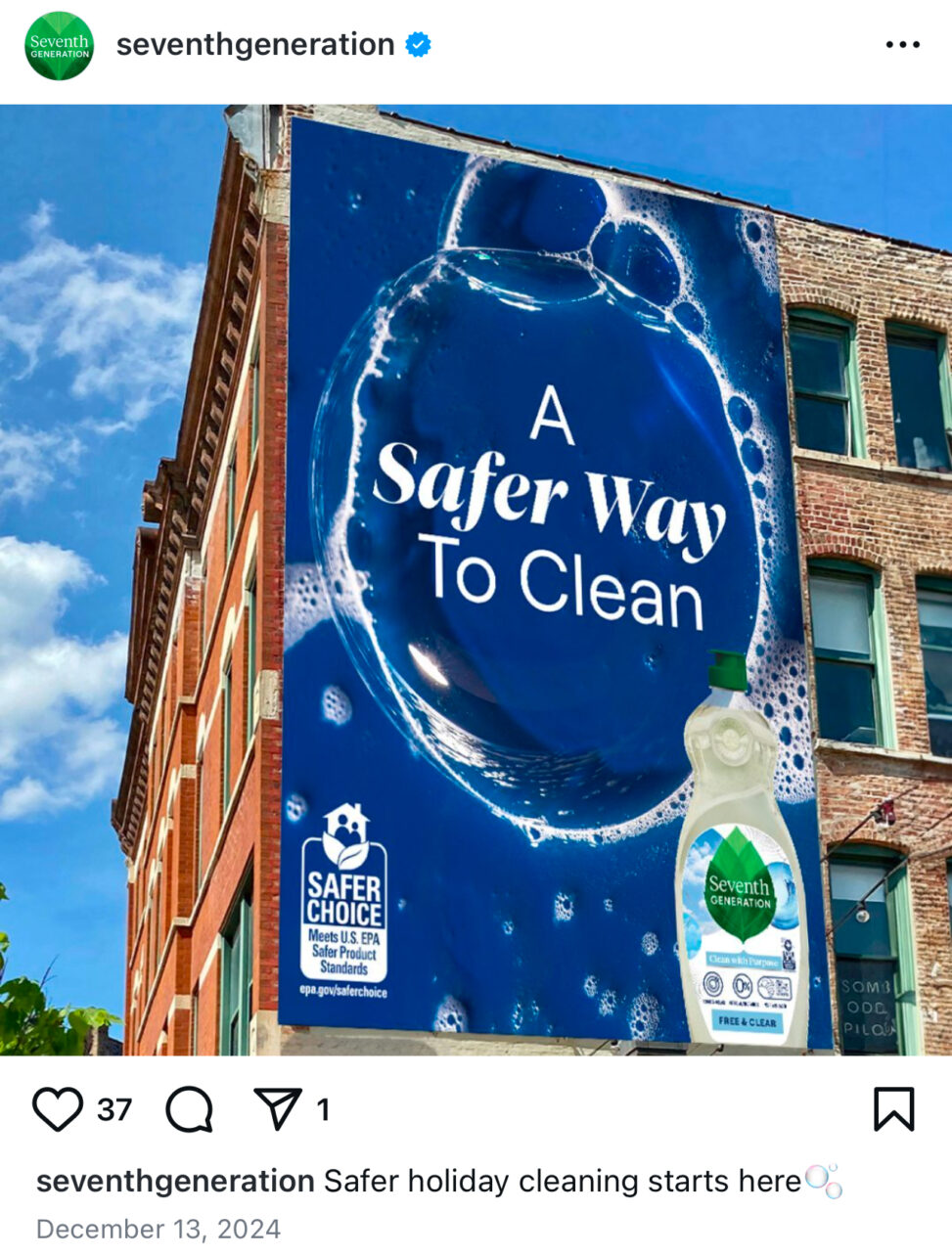Analysis of Seventh Generation’s Instagram Advertisement
Introduction – Today, many companies use advertising to make it appear that they care about social and environment concerns. For instance, a new advertisement for Seventh Generation, a renowned name in environmentally friendly cleaning items, is posted on Instagram today. In the advertisement, a large billboard with a bottle of dish soap and the title “A Safer Way to Clean” prominently displayed on a city skyscraper can be seen. In the background, a city view in a close shot can be seen, with a soap bubble in view, showcasing how effective the cleaner is and that it is environmentally friendly. This analysis will closely examine the advertisement’s design, what it communicates about social and environment concerns, and its message to its target group.
Advertisement Description and Message – Seventh Generation’s advertisement is a photograph ad that conveys its message through photographs. The photo is an Instagram ad from Seventh Generation. It features a large billboard on the side of a red brick building with green window trim. The billboard takes up the majority of the right side of the photo. The left side features a bright blue sky with puffy clouds. The background of the billboard is dark blue with large soap bubbles that look foamy. This gives it a clean and fresh appearance. The centerpiece is the bold white wording announcing, “A Safer Way To Clean,” in the middle of the advertisement. Directly below this declaration is a small white logo for the EPA Safer Choice certification, signifying the brand’s determination to be green. In the bottom right corner of the advertisement, there is a picture of a real Seventh Generation dish soap bottle with green and blue hues, which says “Free & Clear.” The Instagram caption reads, “Safer holiday cleaning begins here,” with a small soap bubble emoji, which helps to solidify the clean and fresh idea. Overall, its message in the advertisement is that its dish soap is safer for humans and for the environment. As Seventh Generation (2025) claims, its cleaners have a source in plants and lack chemicals that can hurt humans and aquatic life. Climate action and reduced use of plastic matter to its corporation, and its actions contribute to larger environmental concerns (Seventh Generation 2025). Viewers are invited to view its product as a responsible one, urging them to choose environmentally friendly purchasing options.
Target Audience and Consumer Appeal – The Seventh Generation advert is tailored for people who care about the environment, specifically people who are concerned with health and green home products. Picking Instagram as an advertising platform shows that they want to appeal to younger people who are online. This is consistent with ethical shopping research that suggests that younger generations, including millennials and Gen Z, would select brands based on their promises of being green. Sociologically, the advert employs the concept of green consumerism, in which purchasing decisions are influenced by perceptions of the environment’s influence. Through the utilization of certification logos and emphasizing honesty, the brand garners consumer trust, a factor that is increasingly significant since consumers are increasingly skeptical of companies’ attempts at being sustainable. Nonetheless, as the Greenwashing Index (2024) asserts, brands must ensure their claims are not deceptive. Seventh Generation’s decades-long dedication to sustainability implies authenticity, but the connection with Unilever calls into question its ability to uphold these values as a corporate-owned business.
Environmental Claims and Greenwashing Concerns – Seventh Generation’s advertisement focuses on the safety and environmental sustainability of its dish soap. However, scholarly research highlights potential contradictions within the green cleaning industry. Research by Sol et al. (2023) identifies dishwashing as a significant contributor to microplastic pollution because dishwashers degrade plastic components over time. Regardless of the use of biodegradable or plant-based soap, microplastic emission from dishwashers remains an issue. Kulesza et al. (2021) also mention risky microbes that can be found in dishwashers. They mention that even “green” cleaning products might not be the solution to all sanitation problems. This means that Seventh Generation products are safer chemically, but they do not completely negate harm to the environment. This is parallel to the criticisms of green consumerism that state that messages about sustainability can potentially make individuals feel as though they are doing something without actually addressing major environmental problems. Therefore, while the ad conveys a positive message, consumers need to consider whether the use of such products actually lessens environmental harm.
Personal Reflection: Did the Advertisement Convince Me? – Being familiar with green marketing strategies, at first sight, this ad felt appealing to me: clean design, certification logos, and an emphasis on safety-the product is responsible. Later, I began to be more skeptical. Research on microplastics and washing dishes makes me wonder if this product will actually reduce environmental impact (Sol et al. 2023). Moreover, the affiliation with Unilever, a large corporation with a complicated environmental record, raises a number of questions regarding the brand’s autonomy in terms of sustainability commitments. That notwithstanding, the ad seems really effective at playing with consumer psychology. It instills a sense of responsibility, whereby viewers would feel that buying this product is contributing to a cleaner environment. This, therefore, matches with various theories of ethical consumption whereby brands use morality-based appeals to influence purchase decisions. I would like more specific data, other than general ingredient choices, on how the product minimizes environmental harm in general. But this is a small scale business and there is not much information about it. Also, there is limited research on this topic.
Conclusion – To sum up, the advertisement of Seventh Generation on Instagram shows how businesses pursue green marketing effectively through appealing visual design and messaging related to certification logos focused on safety. Critical examination uncovers several layers that point toward wider environmental degradation hardly being stemmed with such cleansing action. Having commanded a credible reputation over several decades on ground realities pertaining to environmental sustainability concerns, this particular brand should keep guard against accusation of over-representing a greener position. The case shows the need for critical engagement with advertising in an era beset by the practice of greenwashing.
Bibliography
Greenwashing Index. 2024. “Is Seventh Generation Greenwashing? Laundry Detergent Safety.” Greenwashing Index. Accessed February 1, 2025. https://www.greenwashingindex.com/seventh-generation-detergent/.
Kulesza, Karolina, Agnieszka Biedunkiewicz, Katarzyna Nowacka, Maria Dynowska, Marek Urbaniak, and Łukasz Stępień. 2021. “Dishwashers as an Extreme Environment of Potentially Pathogenic Yeast Species.” Pathogens 10, no. 4: 446. https://doi.org/10.3390/pathogens10040446.
“Seventh Generation.” 2025. Seventh Generation. https://www.seventhgeneration.com/company.
Seventh Generation. 2024. “Safer Holiday Cleaning Starts Here.” Instagram, December 13, 2024. https://www.instagram.com/p/DDhnqYKP5nk/?igsh=MW95bGZxcjRmZ3AwbA==
Sol, Daniel, Antonio Menéndez-Manjón, Susana Carrasco, Juan Crisóstomo-Miranda, Aida Laca, Anabel Laca, and Mario Díaz. 2023. “Contribution of Household Dishwashing to Microplastic Pollution.” Environmental Science and Pollution Research International 30, no. 15: 45140–45150. https://doi.org/10.1007/s11356-023-25433-7.


Pedro Mori
I like your analysis of this and agree that the ad is predominantly targeting Gen Z and Millennials. The ad is being displayed on Instagram, a platform largely dominated by a younger audience. The design of the ad reminds me of other campaigns like Bombay Sapphire and Don Julio, which are more popular with younger people. They also utilized wall graffiti and building side displays as the core of their ad campaign.
The mention of microplastics is also something I found really nice. We hear it so often and the frequency we encounter these plastics in our daily lives seems to be increasing. However, it is very easy to forget about this concern and the possible environmental impacts it can have. I also like how you clarified that you wanted specific data to address your concerns regarding the use of this.
The distinction between your analysis of what is effective and what isn’t is very clear and easy to understand. The one thing I would have liked to know is whether you are the target demographic for this ad. Specifically, are you the kind of person who likes purchasing items because they are eco-friendly? I think that would have given a slight boost in understanding if Seventh Generation is actively targeting the right people.